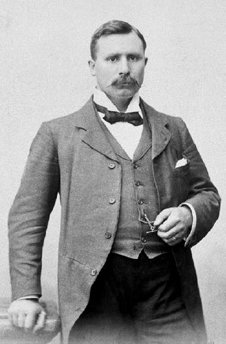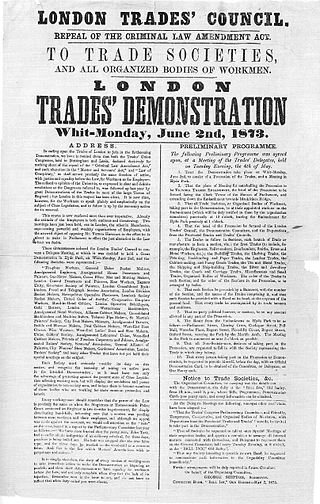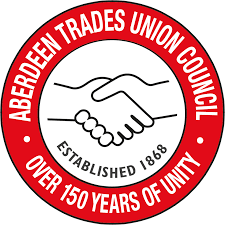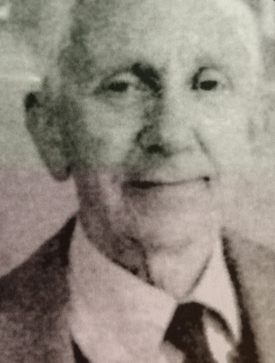Related Research Articles

The Jarrow March of 5–31 October 1936, also known as the Jarrow Crusade, was an organised protest against the unemployment and poverty suffered in the English town of Jarrow during the 1930s. Around 200 men marched from Jarrow to London, carrying a petition to the British government requesting the re-establishment of industry in the town following the closure in 1934 of its main employer, Palmer's shipyard. The petition was received by the House of Commons but not debated, and the march produced few immediate results. The Jarrovians went home believing that they had failed.

The Workers' Socialist Federation was a socialist political party in the United Kingdom, led by Sylvia Pankhurst. Under many different names, it gradually broadened its politics from a focus on women's suffrage to eventually become a left communist grouping.

Thomas Mann, was an English trade unionist and is widely recognised as a leading, pioneering figure for the early labour movement in Britain. Largely self-educated, Mann became a successful organiser and a popular public speaker in the British labour movement.
The Australian labour movement began in the early 19th century and since the late 19th century has included industrial and political wings. Trade unions in Australia may be organised on the basis of craft unionism, general unionism, or industrial unionism. Almost all unions in Australia are affiliated with the Australian Council of Trade Unions (ACTU), many of which have undergone a significant process of amalgamations, especially in the late 1980s and early 1990s. The leadership and membership of unions hold and have at other times held a wide range of political views, including socialist, democratic and right-wing views.
Lewis Jones was a writer and left-wing political activist, born in Clydach Vale in industrialised South Wales.
The National Minority Movement was a British organisation, established in 1924 by the Communist Party of Great Britain, which attempted to organise a radical presence within the existing trade unions. The organization was headed by longtime unionist Tom Mann and future General Secretary of the CPGB Harry Pollitt.

Walter "Wal" Hannington (1896–1966) was a founding member of the Communist Party of Great Britain and National Organiser of the National Unemployed Workers' Movement, from its formation in 1921 to its end in 1939, when he became National Organiser of the Amalgamated Engineering Union.

The Workers' Unity League (WUL) was established in January 1930 as a militant industrial union labour central closely related to the Communist Party of Canada on the instructions of the Communist International.

The Sheffield Trades and Labour Council, usually known as the Sheffield Trades Council, is a labour organisation uniting trade unionists in Sheffield.
The National Hunger March of September–October 1932 was the largest of a series of hunger marches in Britain in the 1920s and 1930s.

The Unemployed Councils of the USA (UC) was a mass organization of the Communist Party, USA established in 1930 in an effort to organize and mobilize unemployed workers.

The Trades Union Congress (TUC) is a national trade union centre, a federation of trade unions that collectively represent most unionised workers in England and Wales. There are 48 affiliated unions with a total of about 5.5 million members. Paul Nowak is the TUC's current General Secretary, serving from January 2023.

The London Trades Council was an early labour organisation, uniting London's trade unionists. Its modern successor organisation is the Greater London Association of Trades (Union) Councils

The Communist Party of Great Britain (CPGB) was the largest communist organisation in Britain and was founded in 1920 through a merger of several smaller Marxist groups. Many miners joined the CPGB in the 1926 general strike. In 1930, the CPGB founded the Daily Worker. In 1936, members of the party were present at the Battle of Cable Street, helping organise resistance against the British Union of Fascists. In the Spanish Civil War, the CPGB worked with the USSR to create the British Battalion of the International Brigades, which party activist Bill Alexander commanded.
Joseph James Vaughan was a British politician.

The Unemployed Workers' Organisation was an organisation of unemployed workers founded in London in 1923. It was a breakaway from the National Unemployed Workers' Movement (NUWM). They opposed the reformist politics and political control by the Communist Party of Great Britain. It was founded by Gunnar Soderberg, a Swedish seaman who had been active in the Industrial Workers of the World (IWW). He had been the London organiser of the NUWM. The organisation was formed following the 1922 Unemployed March organised by the NUWM, whose objectives the UWO believed had been moderated in order to gain acceptance with the Labour Party.

Aberdeen Trades Union Council (ATUC) is the body made up of affiliated trade union branches and organisations working in the Aberdeen and Aberdeenshire area to promote the interests of workers in the region. The ATUC provides services to affiliated branches on a wide range of industrial, social and community issues and is affiliated to the STUC. It has an office based in Aberdeen, Scotland.

Alf Salisbury was a British communist, Jewish activist, trade union leader, and anti-fascist. During the 1930s he smuggled monetary support from British communists to German communists to help resist the Nazis. Salisbury was present at many key events in the history of anti-fascism, including the Battle of Cable Street, and was also a member of the International Brigades during the Spanish Civil War (1936-1939). In his later life, Alf Salisbury led a successful campaign to convince the BBC and other British news outlets to stop using the term "Mongols" to refer to people with Down Syndrome. For this work he was awarded with special commondations from the Mongolian embassy and a stay in a Mongolian health spa. He was a member of the Communist Party of Great Britain (CPGB), before becoming a founding member of its continuation, the Communist Party of Britain (CPB).
Emily Elizabeth Swankie was a British activist and campaigner who participated in the National Hunger March from Glasgow to London to protest against poverty and unemployment in the United Kingdom.
William Henry Thompson (1885–1947) was an English radical lawyer closely involved with trade unions, who founded Thompsons Solicitors. From the 1920s he was associated with the Communist Party of Great Britain (CPGB). He was married to Joan Beauchamp, a prominent suffragette.
References
- ↑ Perry, Matt; Bread and Work: Social Policy and the Experience of Unemployment, 1918-39 p. 104; Pluto Press, 2000 ISBN 0-7453-1486-4
- ↑ Hitchner, Dell Gillette; Civil Liberties in England from 1914 to 1940 p. 144; University of Wisconsin-Madison, 1940
- ↑ "Liberty". liberty-human-rights.org.uk.
- ↑ "Manifesto of the Unemployed Workers' Organisation". Workers Dreadnought . X (16). 1923.